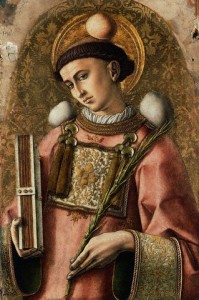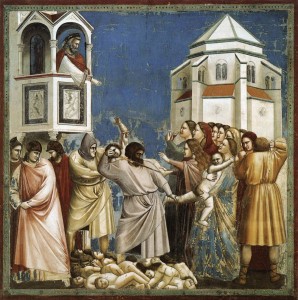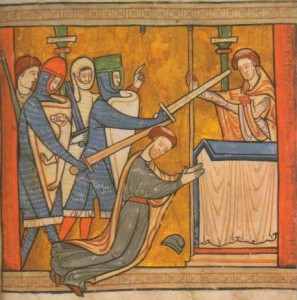Leaving the Stable: The Paradox of Christmas
Christmas is one of those times of the year when you can most clearly see the trappings of half-remembered religious observance among white Westerners. Even in notoriously secular B.C., most people [seem to] take for granted and even look forward to listening to standard musical favourites like “Silent Night,†“God Rest Ye Merry Gentlemen,†and “Joy to the World†that are explicitly religious.
The phrase “cultural echo†comes to mind during these times. It’s like seeing someone wear a cross as a fashion statement, or having trouble finding a seat in church on Christmas Eve. There are traditions that belong not just to Christians but to the culture at large. This is why I try to be welcoming to what are known among believers as “C & Eâ€[1] Christians. Although it may seem depressing that they come for the warm and comfortable glow of tradition rather than to be challenged by the scandalous reality of God’s inglorious entry into human flesh, who am I to deny their whole-hearted acceptance of Jesus’ invitation in Matthew 11:28: “Come to me, all you that are weary and are carrying heavy burdens, and I will give you rest.â€
And yet, of course, there are ways that this can be subverted in a healthy and kin(g)dom-promoting manner, and we sneakily found a way to write them right into our calendar!
Christmas, of course, is not just one day in the Christian calendar, but a whole season made up of twelve days (yes, that’s where the song comes from). When a new believer first becomes familiar with the liturgical calendar, she may find something very odd. Christmas, a special time of the year for us incarnational Anglicans, is bracketed by some strangely unsettling notions and remembrances.
On one side, we have the season of Advent. This is often billed as a time of expectation leading up to the “big event†on Christmas. In a traditional Anglican Church you will hear beautiful music and maybe enjoy the sight of children lighting the Advent wreath. However, the Scripture readings for those four weeks stand out starkly. Isaiah and Revelation feature prominently, and while both texts have passages which are comforting and familiar (think Handel’s Messiah), they tell us about a Christ who is to come again at the end of time, bringing judgement. Advent is a time of unsettlement, when we are reminded of the parts of the world that cry out for justice. Our prayers for Christ to come again are an admission that we don’t have everything right and need God’s strength and justice to heal us.
Christmas comes at the perfect time, because we are then brought into the stable and reminded that God did not choose to come among us as a vengeful and omnipotent warrior-king, but as a vulnerable infant born to unwed refugees. The story shows an excellent balance between God’s promise to restore all things and our commitment to sheltering/nurturing the divine when it is found on the roadsides of our world.
Our awareness of this balance is heightened in the days that follow Christmas. The day after Christmas is the Feast of Stephen, as we learn in the carol “Good King Wenceslas.†What a lot of non-church folks may not realize, though, is that Stephen was the first martyr of the early Church. His death, by stoning, is recorded in the Book of Acts. We cannot stay in the stable because we must learn the great cost of discipleship in the world God has hallowed.
The next day, December 27th, is the feast day of St. John the Evangelist. We learn in the Gospel of John that “the light shines in the darkness, and the darkness did not overcome it.†(John 1:5). Likewise, in John 1:10-11, we learn that Jesus “was in the world, and the world came into being through him; yet the world did not know him. He came to what was his own, and his own people did not accept him.†John’s Gospel is full of conflict, and indeed the text itself has a dark history of misuse. The Word lives among us in the mud of everyday human conflict. We cannot stay in the stable, because if we do we will never recognize Jesus as he grows up into a tempestuous, troubling, and boundary-breaking adult.
December 28th is the feast of The Holy Innocents. These are the unnamed children butchered by Herod’s soldiers in Matthew’s Gospel. They are considered by some to be the very first martyrs, which is most compelling considering they confess no creed. We cannot stay in the stable because the Holy Family themselves leave for Egypt in order to escape Herod’s wrath. We accept that those in authority are just as likely to be tyrannical as anyone else, and we pray for the ascent of a new authority that does not stem from intimidation but compassion and solidarity.
Finally, December 29th is the feast of St. Thomas à Becket, Archbishop of Canterbury from 1162 to 1170, brutally murdered by followers of King Henry II. Becket and Henry II had been engaged in conflict over ecclesiastical rights versus the rights of the state. Although Henry may not have intended for Becket to be murdered, once again we witness the struggle between institutions of authority, both secular and sacred. We cannot stay in the stable because we must work together to heal broken institutions.
The fact is that Christmas is not about warm fuzzy animals, a cute pink-cheeked baby, and a young golden-haired Mary. Jesus comes into a world that smells of manure. He is laid in a trough by his unmarried teenaged mother, and then whisked away as a refugee, member of a religious tradition viewed as primitive by many of the peoples that encountered it. He comes into a world that wants none of him or his message of love.
He came as a “minority,†if you will.
The Glorious Impossible is that it is all intentional.
This is God’s step forward in His dance with us, God’s extending of Her hand to us.
We cannot stay in the stable. If we do, no-one will hear our songs.


